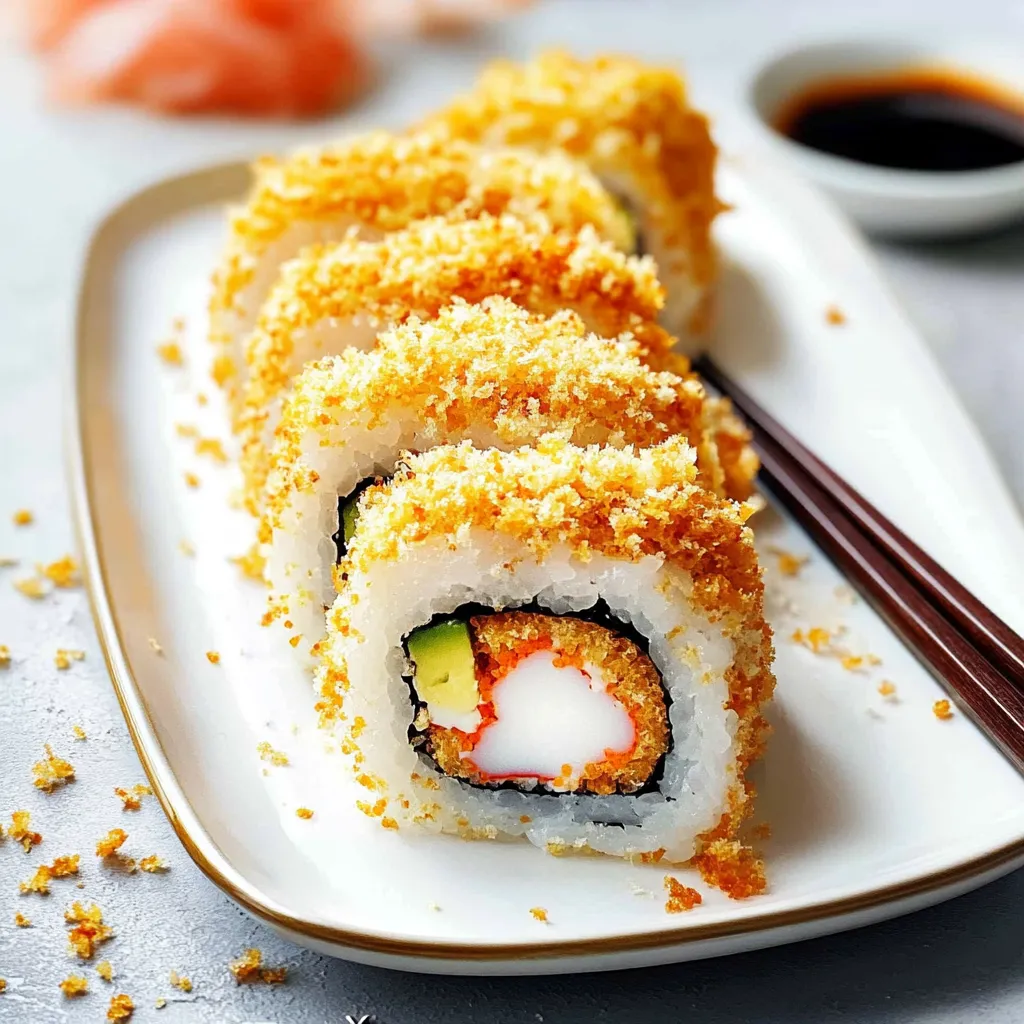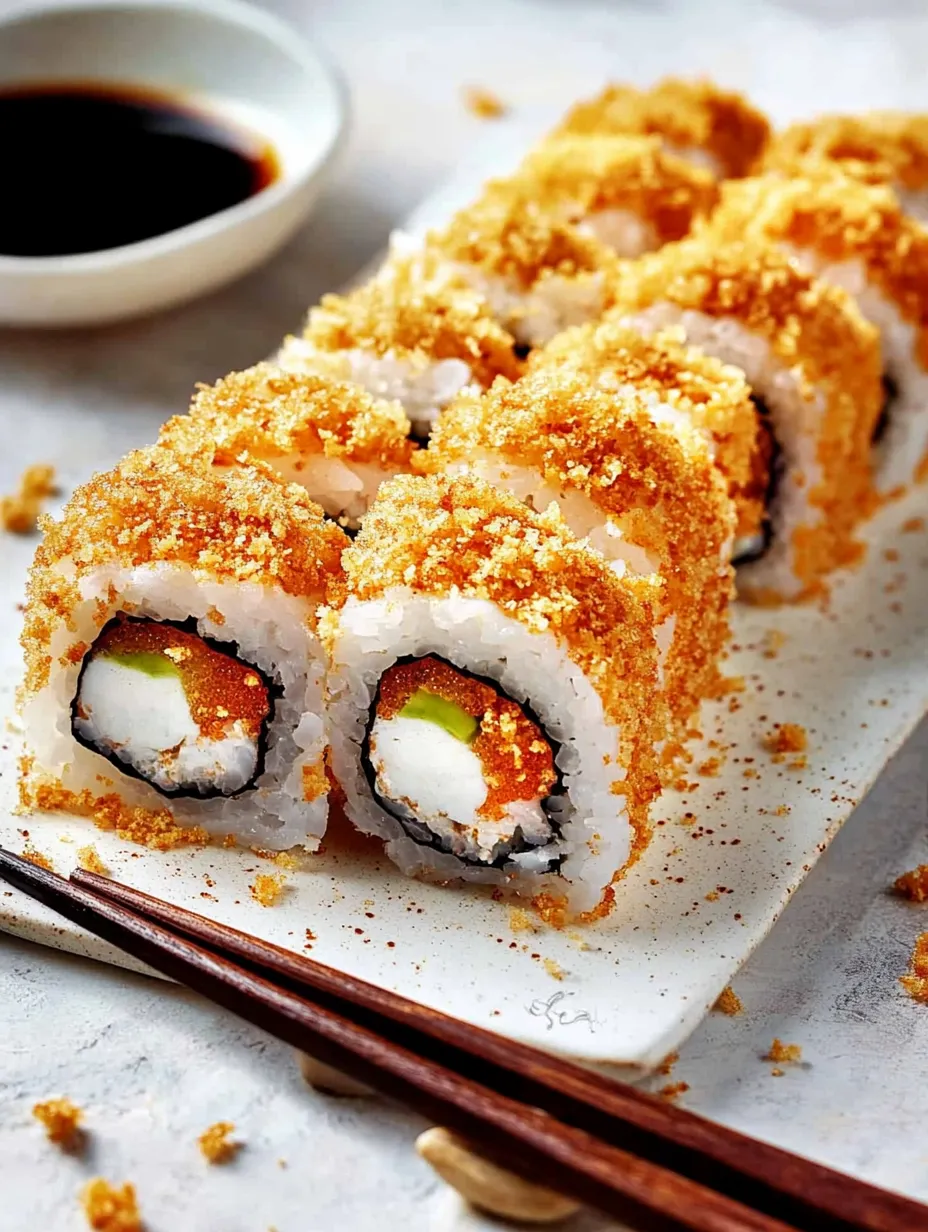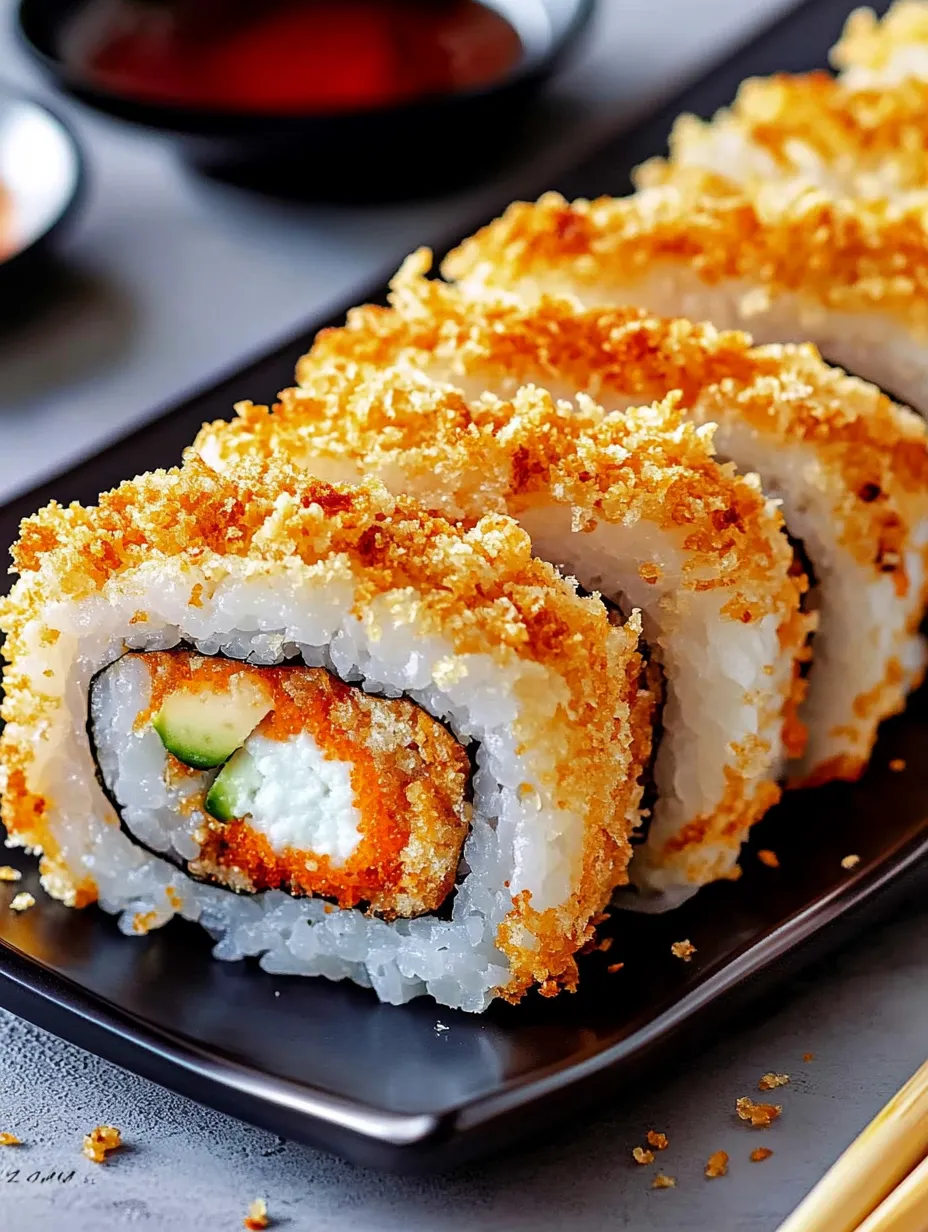 Save
Save
Crunchy roll sushi brings together everything I love about sushi - perfect rice, fresh ingredients, and that irresistible textural contrast. This variation of California roll features crispy shrimp tempura and creamy avocado, all topped with golden panko crumbs that create the most satisfying crunch with every bite.
The first time I made these at home, I was skeptical about getting that perfect crunch. After watching my favorite sushi chef make something similar, I asked a few questions and tried to recreate it in my kitchen. My first attempt was decent but not quite right. By the third try, my husband claimed they were better than our local Japanese restaurant's version. The key was getting those panko breadcrumbs perfectly toasted - not burnt, not undercooked, but golden brown and incredibly crispy.
Quality Building Blocks
- Sushi rice: Short-grain Japanese varieties like Saitaku or Tamanishiki make all the difference. The stickiness and texture are essential for authentic sushi.
- Nori sheets: Look for deep green, crisp seaweed sheets. Lower quality ones can be fishy or chewy in unpleasant ways.
- Shrimp tempura: Whether homemade or store-bought, this provides the protein backbone of the roll. The crispy batter adds another layer of texture inside.
- Ripe avocado: Find that perfect balance - soft enough to be creamy but firm enough to hold its shape when sliced.
- Panko breadcrumbs: Regular breadcrumbs won't work here. Japanese panko has a lighter, airier texture that creates that signature crunch.

When I visited Japan years ago, I watched a sushi master prepare rice with such care it almost seemed like a meditation. He explained that good sushi begins with properly prepared rice - not too wet, not too dry, seasoned just right. I've tried to bring that same mindfulness to my home kitchen. The rice truly is the foundation everything else builds upon.
Rolling Technique
- Rice preparation
- Rinse your rice thoroughly until the water runs clear. This removes excess starch that makes rice gummy. I usually rinse five or six times, swirling with my fingers between each rinse. After cooking, the seasoned vinegar should be folded in gently, not stirred aggressively which would crush the grains.
- Perfect panko topping
- Toast panko in a dry skillet over medium heat, stirring constantly. Don't walk away - these go from perfect to burnt in seconds. You want an even golden color throughout. I like adding a touch of butter during the last minute of toasting for extra flavor, though traditional recipes use just oil.
- Hand moistening
- Keep a small bowl of water with a splash of rice vinegar nearby when working with sushi rice. Dip your fingers in this mixture before handling rice to prevent sticking. I learned this trick from a YouTube video and it saves so much frustration during the rice-spreading step.
- Roll assembly
- Lay your nori shiny side down, spread rice evenly but not too thickly, flip over, then add fillings. The key is not overfilling - less is more with sushi rolls. Position fillings slightly off-center toward you for easier rolling. I've ruined many rolls by trying to stuff too much inside.
- Rolling technique
- Use your bamboo mat covered in plastic wrap to create a tight roll. Tuck the edge closest to you over the fillings, then use the mat to continue rolling forward while applying even pressure. Too loose and it falls apart; too tight and ingredients squish out the sides. It takes practice to find that perfect pressure.
- Panko coating
- After rolling, spread your cooled toasted panko on the plastic-covered bamboo mat and gently roll your sushi through it, pressing lightly to adhere. This creates that perfect exterior crunch without crushing the roll. My first attempts had panko falling off everywhere until I figured out this method.
My teenage daughter brings friends over specifically when I'm making these rolls. What started as an attempt to save money on takeout has become a favorite family activity. We set up an assembly line - my husband handles rice prep, I manage the rolling, and my daughter creates different dipping sauces. Even our pickiest eater loves these rolls, though he picks out the avocado when he thinks I'm not looking.
Serving Style
These rolls look beautiful served on a rectangular plate with small bowls of soy sauce, spicy mayo, and wasabi. For casual dinners, I arrange them alongside some simple miso soup and cucumber salad. For entertaining, I'll make several varieties of rolls and arrange them on a large wooden board with pickled ginger and decorative wasabi swirls. The vibrant green avocado and golden panko create a naturally appealing presentation without much extra effort.
Creative Variations
While I love the classic version, this recipe welcomes personalization. Sometimes I add thin cucumber strips for extra freshness and crunch. For spicy versions, mixing sriracha with mayo and drizzling it over the shrimp before rolling creates heat that balances beautifully with the cool avocado. My husband prefers when I add a touch of cream cheese, which isn't traditional but creates a richer, creamier bite. For guests who don't eat seafood, I've used crispy tofu as a substitute for the shrimp with surprisingly good results.
Make-Ahead Tips
Sushi is best enjoyed fresh, but you can prepare components ahead of time to make assembly quicker. Cook and season rice up to four hours ahead, keeping it covered at room temperature (not refrigerated, which hardens the rice). Toast the panko breadcrumbs a day in advance and store in an airtight container. Prepare your fillings shortly before rolling. Fully assembled rolls can be wrapped tightly in plastic and refrigerated for a few hours, though the nori will soften somewhat.

I've been making these crunchy rolls for about five years now, steadily improving with each attempt. What started as an intimidating challenge has become something I can prepare without even consulting a recipe. There's something deeply satisfying about creating something that once seemed possible only in restaurants. The combination of soft rice, crispy tempura, creamy avocado and that golden panko coating creates a perfect bite every time. When friends ask where I ordered from and I tell them it's homemade, their surprise makes all the effort worthwhile.
Common Recipe Questions
- → Can I make this recipe with raw fish instead of shrimp tempura?
- Yes, you can substitute the shrimp tempura with sushi-grade raw fish like salmon or tuna. Just make sure to purchase fish that's specifically labeled as sushi-grade from a reputable source. Slice it into thin strips before adding to your roll.
- → What if I don't have a bamboo sushi mat?
- While a bamboo mat makes rolling easier, you can use a clean kitchen towel or a silicone mat instead. You can even use a sheet of parchment paper or plastic wrap, folded to create a firm edge that helps you apply even pressure as you roll.
- → How can I make my own spicy mayo for serving?
- Combine 1/4 cup mayonnaise with 1-2 teaspoons of sriracha sauce (adjust to your preferred spice level). For extra flavor, add a few drops of sesame oil and a squeeze of lime juice. Mix well and refrigerate until ready to serve.
- → Why is my sushi rice falling apart when I try to roll it?
- This usually happens when the rice is either too hot or not sticky enough. Make sure to use proper sushi rice and let it cool just slightly after cooking (it should still be warm). Also, don't skip the vinegar step - it helps the rice stick together while adding flavor.
- → Can I prepare these rolls in advance for a party?
- You can prepare the components ahead of time (cook rice, toast panko, prepare fillings), but it's best to assemble the rolls shortly before serving. If needed, you can make the rolls up to 2-3 hours ahead and store them covered with plastic wrap in the refrigerator, but the rice may harden and the nori may become soggy if made too far in advance.
